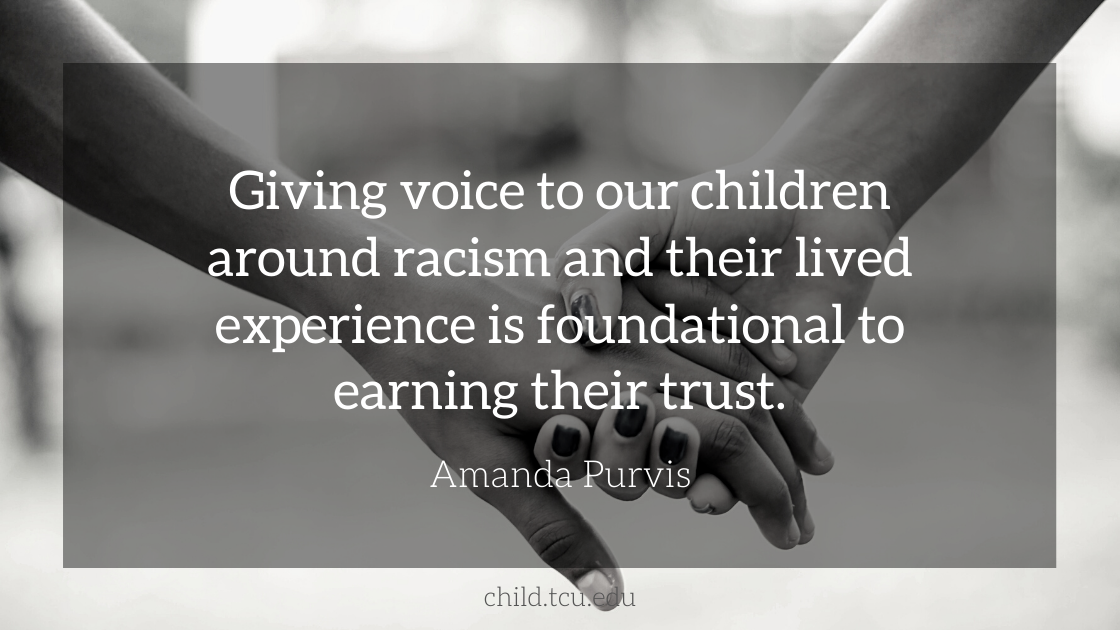
by: Amanda Purvis
At the Karyn Purvis Institute of Child Development we strive to help children heal from trauma, abuse, and neglect. Historically, we have responded to national and international issues from the lens of healing trauma. The current unrest resulting from structural racism, institutional racism, and individual racism in America requires us to address racial trauma in a clear and decisive way.
As a white woman, raising black boys and girls, I do not have the ability to hide behind privilege or white fragility. Even if I wanted to. The following narrative is how I, a thirty-something white mom, am trying to parent my children. I don’t claim to have all the answers, but I do believe that Trust Based Relational Intervention® (TBRI®) and it’s attachment-based, sensory-rich, trauma-informed practices have given me a lens of understanding for how to begin bracing my children for what lies ahead of them.
Giving Voice
In TBRI® we believe that giving voice is foundational to healing. When we teach parents about giving voice, we remind them that a child who does not have a voice must use triangulation, manipulation, aggression, and violence to get their needs met. We encourage them to meet the need, and THEN teach the children in their care how to use their words to get their needs met in the future. In order for this to work, we as the people in power must listen to our children’s words. We must respond to their words. What can we do today to respond to the words of our fellow Americans who are marginalized? They have used peaceful protesting and their voices for centuries, and yet their needs to be seen and valued equally by all remain unmet. And if we don’t respond, we will never heal the racial trauma that permeates our land. Even if you have very young children, now is a foundational time to be starting discussions about race with them, and most importantly, listening to them.
If you are raising children of a race different than your own, this is even more critical. Giving voice to our children around racism and their lived experience is foundational to earning their trust. This means we do not change the narrative or gloss over it. It means we sit with them in all of their feelings. If you are providing care for black and brown children right now, they will absolutely show you how they’re feeling about the stories they see from the news. That extra push against your authority, that exaggerated eye roll, the cursing, and the questioning your respectability is a part of them processing what is going on in our world. It is imperative that we are very clear with our children that we stand against racism. If we don’t clarify it for them, we are leaving it to the narrative of many in this country.
Felt-Safety
So how do we create felt-safety for our children? We make sure they know that we are a safe place and that ALL of their feelings are honored in our homes. We hold space for their fear, their anger, their exhaustion. We also need to acknowledge that some of their recent behaviors are likely tied to this unrest we feel as a society. Help them put language to that by using yourself as an example.
I really over reacted the other day to my son’s disrespectful behavior. He is 12, and him saying “no” when I ask him to do something isn’t normal behavior, but let’s just say it has happened before. The other day I asked him to start the dishwasher, and when he refused and walked to his room, I completely overreacted. When he and I talked about it later, I apologized. I told him how I am especially on edge lately because of what happened to George Floyd. He looked at me sideways and said, “Don’t forget you’re white!” Point made.
I went on to explain that as his mama, one of my worst fears is that he would respond out of fear or his earned distrust of police or other authority figures, and never come home. We talked about what it means to respect authority and yet mistrust authority. Holding those two things at once is what my twelve-year-old refers to as “big brain”. I laughed and said, “Big brained. And big hearted.”
I certainly don’t have answers, and I will never claim to understand, but he knows where I stand: with him. Every time.
Resources that may be helpful in talking to your children about race:
Conversations With Kids About Race (Phi Delta Kappan)
How White Parents Can Talk to Their Kids About Race (NPR)
Coming Together: Standing Up to Racism (CNN/Sesame Street Town Hall)